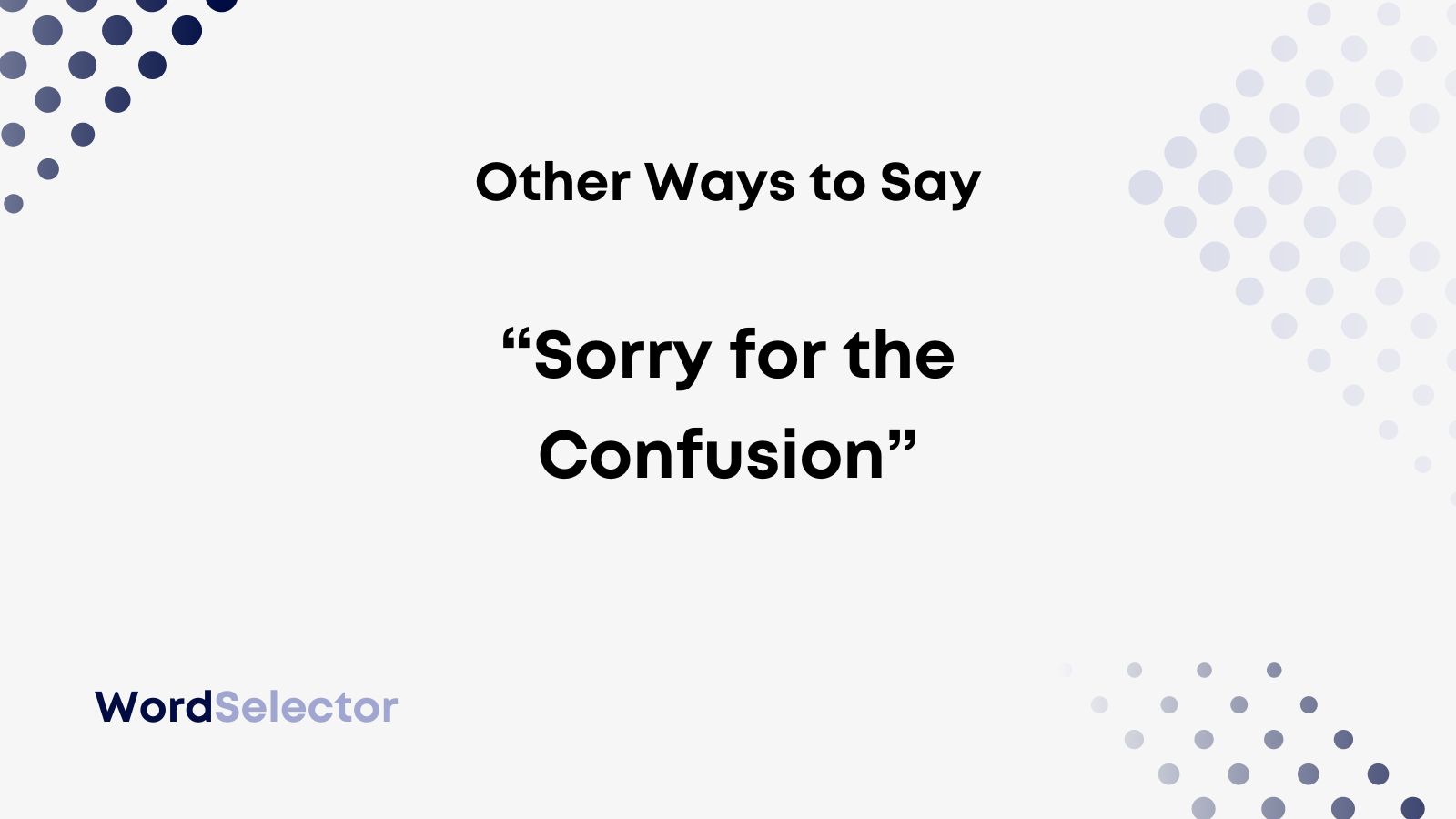If you’re trying to figure out how to apologize professionally when you’ve caused some confusion, you’ve come to the right place!
Down below, we’ve compiled a list of formal and informal synonyms for the phrase “sorry for the confusion,” so you’re always prepared to correct your mistakes!
Other Ways to Say “Sorry for the Confusion”
- Apologies for the misunderstanding
- My mistake
- I’m sorry if I confused you
- I apologize for the confusion
- I apologize for any confusion on my part
- Sorry if that was confusing
- Sorry if I caused confusion
- I did not intend to confuse you
- I apologize if I was unclear
- Apologies for the miscommunication
- My bad
- I’m afraid it seems we’ve misunderstood each other
- Sorry for getting our wires crossed
- Sorry for the confusion caused
- I apologize for any confusion caused
- Sorry for all the befuddlement
KEY TAKEAWAYS
- The phrase “sorry for the confusion” is correct and perfectly okay to use in both formal and informal settings, depending on the surrounding context.
- As an especially formal alternative, you can say “apologies for the misunderstanding.”
- In informal settings, you can say “my mistake!”
Before you go! We still need to unpack our choice of formal and informal synonyms for “sorry for the confusion” in more detail. We’ll even throw in a couple of helpful examples.
After that, we’ll discuss whether it is correct to say “sorry for the confusion” in your work emails or otherwise.
Apologies for the Misunderstanding (Formal)
“Apologies for the misunderstanding” is another way to say “sorry for the confusion”, especially in formal circumstances.
Firstly, you can use this phrase at work or school in a situation where some miscommunication or misunderstanding has led to confusion.
Secondly, this phrase is not superior to “sorry for the confusion,” but it does have a slightly more formal tone. This makes it suitable to use in professional emails with clients or superiors.
Finally, let’s see a sample email making use of this phrase:
Dear Lucilla,
When I said to contact the client using that email, I meant, please send it via that email address. That is not the email address of the client but of one of our departments.
Apologies for the misunderstanding!
The client’s email is below.
Regards,
Beck
My Mistake (Informal)
If you’re trying to figure out how to say “sorry for the confusion” without saying sorry, we would recommend the phrase “my mistake.”
This phrase is an interjection that’s most suitable for informal settings.
Like the original phrase, this one lets the receiver know that you are taking responsibility for the issue, even though it doesn’t include an apology.
It’s not a better phrase than “sorry for the confusion.” In fact, it may even be considered less polite, although it’s not impolite by any means!
Therefore, we wouldn’t recommend using this phrase in formal settings. However, you can use it in a message to a friend or co-worker. For example, when you are asking them to ignore your previous email on account of an error.
Lastly, consider this email example to see this phrase in action:
Dear George,
Please ignore my last email. I stated in the memo that the Cruise agreement occurred in February of 2021, but it was actually in March.
My mistake! I’ve attached a corrected memo below.
All the best,
Heather
Is It Okay to Say “Sorry for the Confusion”?
The phrase “sorry for the confusion” is grammatically correct. Moreover, it is neither particularly formal nor informal. Therefore, it’s okay to use it in all kinds of circumstances, depending on the context.
Nonetheless, it never hurts to change up your phrasing here and there, whether at work or in casual settings. Thus, you can use our list of synonyms if you want to keep your correspondence fresh and avoid using the same phrase over and over again.
“Sorry for the confusion” is not the most formal option, but it is not rude by any means. In fact, it’s perfectly polite!
Therefore, you should have no trouble using it in your emails if you’ve made a mistake, no matter who the receiver is.
In conclusion, “sorry for the confusion” is correct, polite, and suitable for most settings.
We hope this article has dispelled any confusion about this phrase! If you think you might like to use our list of synonyms in the future, feel free to bookmark this page.

